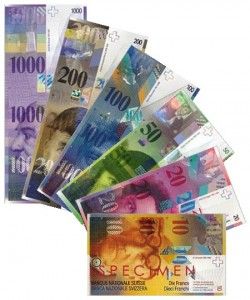Monday

Hey, Franclin!
The year 2015 whirled in like a tornado. I was tied up with law office stuff for twelve-and-a-half straight days, finally knocking off late Saturday morning. It's not exactly the way I wanted to start the new year, but hopefully things are returning to normal now.
I was really chomping to write about the Swiss Franc debacle last week. I have fairly heavy exposure to the Swiss Franc. After ditching physical gold and silver, I resorted to three main investment vehicles. Two of the three (Permanent Portfolio and Merk Mutual Funds) invest in it. I knew the Franc's 40% explosion meant that Permanent Portfolio had done well, but I wasn't sure about Merk. I anxiously clicked on its current holdings page . . . to see that it had heavily shorted the Franc in two of the three funds I hold.
Well, that certainly was disappointing. It was like, as they say about hockey ties, kissing your sister: my nice gains in Permanent Portfolio were wiped out by the losses in Merk.
Oh well. It's nothing to fret about. Besides, I was more interested in the wildly-divergent criticism of how the Swiss National Bank detached from the Euro peg.
The problem, the critics said, was that the SNB sprung it on everyone, with the result that many investors were caught short, with the result that they were, well, caught short. Margins calls were made. The cash wasn't available. Turmoil resulted.
According to the critics, the central banks need to telegraph their moves, so there are no sudden moves in the markets. By the central banks telegraphing their moves, investment bankers can adjust their (and, by extension, their clients') portfolios in anticipation, thus assuring that there are no disruptions like this.
I guess it makes sense, but what does that say about our "free" markets? Now, when I say "free market," I mean an economy that is not controlled or manipulated by government. The central banks are technically private institutions (at least the Federal Reserve is), but no one really believes that. Everyone knows the central banks answer to the politicians and, for the most part, do what the politicians want. They're "in this together" and "this" refers to manipulating and controlling the economy. The foremost historian of the Federal Reserve points out that this has been the problem from the very start of the Federal Reserve, with different Chairmen showing differnet degrees of independence: "[T]he Fed gets pushed by the market and by the politicians and some [Fed Chairmen] are better at resisting and some aren't." Link to extensive interview with Allan Meltzer at Forbes.
This, of course, is no surprise. The Fed pushes interest rates up and down to accommodate upcoming elections and current political whims. Everyone has known this since the controversy surrounding Greenspan's refusal to help Bush get re-elected in 1992. But in this case, we're talking about leaking information ahead of time so "market forces" can take the information into account and react accordingly, kinda like the way a CEO might watch raw material price fluctuations and demographic trends to figure out how to allocate production resources. This, it seems to me, signals that the Federal Reserve isn't merely setting a few broad policies at the top of the economy, influencing it like weather patterns might vaguely influence a person's day, but rather it is embedded in the heart and soul of the everyday economy. It's not winding a clock (set interest rates here for awhile) and letting it run, but rather moving the hands themselves.
I don't claim to understand these economic things. Even to call myself an "amateur" in such matters would be an insult to amateurs, but I was deeply troubled to see so many people rail against the Swiss National Bank for not "leaking" (that was often the word used) the information ahead of time. It struck me as terribly, terribly wrong, and I couldn't get it out of my head over the weekend. This post is my attempt to make sense of it. There is, no doubt, a lot more to this, but that's all the surface I'm going to scratch today.
